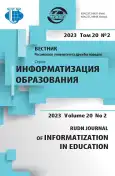Definition of reflection characteristics of educational process participants with artificial intelligence application
- 作者: Grinshkun V.V.1, Dreytser S.I.2,3
-
隶属关系:
- RUDN University
- Moscow City University
- LLC “Cerevrum”
- 期: 卷 20, 编号 2 (2023)
- 页面: 127-137
- 栏目: EVOLUTION OF TEACHING AND LEARNING THROUGH TECHNOLOGY
- URL: https://journal-vniispk.ru/2312-8631/article/view/321276
- DOI: https://doi.org/10.22363/2312-8631-2023-20-2-127-137
- EDN: https://elibrary.ru/KGBQIW
- ID: 321276
如何引用文章
全文:
详细
Problem statement . Artificial intelligence (AI) conversational tools like chat-bots, virtual assistants and dialog trainers begin to apply in education. However, its efficiency wasn't explored because of novelty and lack of related application experience. In this research an approach to conversations based on AI is considered as means to define reflection of educational process participants. And definition results of reflection are compared between an AI conversational tool and an expert's assessment in the educational process. Methodology . Opportunities of conversational simulations based on AI were analysed for reflection assessment. Behavioural markers of reflection in communication were developed as well as assessment procedures in online mode with AI simulations and in offline mode with an expert assessment. Research was provided as a part of the volunteer’s competition. There were 65 participants of the research, students of schools and universities. Statistical processing of the results was performed using Pearson's criteria. Results. Weak correlation was detected between AI and expert assessment. Conclusion. Suggestions were offered about AI assessment improvement for increasing assessment precision of reflection of educational process participants from the methodological point of view as well as from AI algorithms development.
作者简介
Vadim Grinshkun
RUDN University
Email: vadim@grinshkun.ru
ORCID iD: 0000-0002-8204-9179
Academician of the Russian Academy of Education, Doctor of Pedagogy, Professor, Professor of the Department of Information Technologies in Continuous Education
6 Mikluho-Maklaya St, Moscow, 117198, Russian FederationSofya Dreytser
Moscow City University; LLC “Cerevrum”
编辑信件的主要联系方式.
Email: dreitsersi562@mgpu.ru
ORCID iD: 0000-0001-8549-1627
PhD student, Institute of Digital Education, Moscow City University; instructional designer, LLC “Cerevrum”
4 2-y Selskokhozyaistvennyi Proyezd, Moscow, 129226, Russian Federation; 42 Bolshoy Bulvar, bldg 1, Moscow, 121205, Russian Federation参考
- Dobrica VP, Goryushkin EI. The use of an intelligent adaptive platform in education. Auditorium. 2019;(1):1-7. (In Russ.)
- Krechetov IA, Romanenko VV. Artificial intelligence in education: the implementation of adaptive learning based on educational analytics. Modern Education: Improving the Competitiveness of Universities: Proceedings of the International Scientific and Methodological Conference. 2021;(2):77-84 (In Russ.)
- Chetyrbok PV, Shostak MA. Adaptive learning using artificial intelligence in distance education. In: Makoveichuk KA. (ed.) Information Systems and Technologies in Modeling and Management: Proceedings of the V International Scientific and Practical Conference (Yalta, 20-22 May 2020). Yalta: Arial Publ.; 2020. p. 461-464 (In Russ.)
- Prokhorova MP, Mineeva OA, Blagodinova VV. Studying the attitude of university students to the digitalization of education. World of Science. Pedagogy and Psychology. 2020;8(2):1-9. (In Russ.)
- Starichenko, B.E. Digitalization of education: realities and problems. Pedagogical Education in Russia. 2020;(4):16-26. (In Russ.)
- Alekseev NG. Designing the conditions for the development of reflective thinking (Ph.D. thesis). Moscow; 2002. (In Russ.)
- Karpov AV. Psychology of reflexive mechanisms of activity. Moscow: Institute of Psychology; 2004. (In Russ.)
- Shchedrovitsky GP. Communication, activity, reflection. Study of Verbal and Mental Activity. Almaty: Kazakhstan Pedagogical Institute; 1974. p. 12-28 (In Russ.)
- Drigas A, Mitsea E. The 8 pillars of metacognition. International Journal of Emerging Technologies in Learning. 2020;15(21):162-178. http://doi.org/10.3991/ijet.v15i21.14907
- Sizikova TE. Meta-model of reflection within the framework of meta-ontology. Siberian Journal of Psychology. 2018;(68):1-26. (In Russ.)
- Alekseev NG. Design and reflective thinking. Development of Personality. 2002;(2):85-102. (In Russ.)
- Obidina TV. The development of reflection and the manifestation of conformal tendencies in interpersonal relations among modern boys and girls. World of Science. Pedagogy and Psychology. 2018;(5):1-8. (In Russ.)
- Anistrenko TG. Social reflection: a transdisciplinary approach. Humanitarian, Socio-Economic and Social Sciences. 2016;(8-9):1-9. (In Russ.)
- Anikina VG, Lagutin AV. The Reflexive aspect of the perception of each other by the subjects of the conflict. Psychological Science and Education. 2022;27(1):104-120. (In Russ.) http://doi.org/10.17759/pse.2022270109
- Fisher R, Ury W. Getting to yes: negotiating agreement without giving. Moscow; 1992. (In Russ.)
- Khasan BI, Sergomanov PA. Psychology of conflict and negotiations. Moscow: Academiya Publ.; 2004. (In Russ.)
- Koval MV, Dontsov AI. Psychological features of manifestation of reflection during negotiations. Bulletin of TSU. 2008;(11):188-191. (In Russ.)
- González-Calatayud V, Prendes-Espinosa P, Roig-Vila R. Artificial intelligence for student assessment: a systematic review. Applied Sciences. 2021;11(12):5467 http://doi.org/10.3390/app11125467
- Vysotskaya P, Zabelina S, Kuleshova J, Pinchuk I. Using the capabilities of artificial intelligence in the development of reflection skills. E3S Web of Conferences. 2020;210(2):22035. http://doi.org/10.1051/e3sconf/202021022035
- Ryzhova NE. Assessment center. Step by step. Development and implementation navigator. Accent Graphics Communications; 2015. (In Russ.)
- Spencer LM, Spencer SM. Competencies at work. Moscow: Hippo Publ.; 2005. (In Russ.)
补充文件









